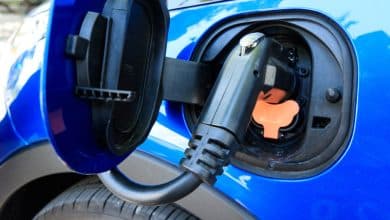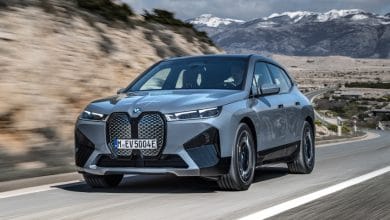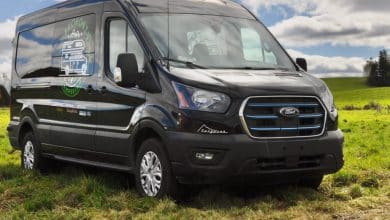Atypical, expensive, but devilishly endearing, the Countryman is reinventing itself this year. More voluminous, more practical, more electric too, the Countryman is distancing itself from the rest of the Mini range to win over a new clientele.
Don't be fooled by the UK flag on the Countryman's taillights. The Countryman now originates from Germany alongside BMW, from whom this Mini borrows many components.
These are probably the only two exceptions to the history of this model, which first appeared in 1961. At that time, the Countryman looked like an elegant van surrounded by varnished wooden panels. To accentuate its chic appearance, this Mini had a generous carpet on its floor. Longer than the traditional Mini, yesterday's Countryman also had a trunk worthy of the name. It could even be modulated by folding down all or part of the backs of the rear bench seat to create a completely flat loading area. The original Countryman continued to be sold until 1969. Its distribution was modest (just over 200,000 were built), unlike its clientele, which was known for having very deep pockets.
Resurrected in 2010, the Countryman is still aimed at financially well-off consumers. However, it has managed to achieve the goal set by the founding model, namely to attract new customers.
With over a million units sold since its re-entry into service, the Countryman is a success.
This third generation of the modern era has assets to do even better than its predecessors. Starting with the addition of a fully electrified version (see our boxes) in the coming weeks. This will be inserted between the two gasoline versions (S and JCW) currently visible in showrooms.
-
PHOTO PROVIDED BY MINI
The 2025 Mini Countryman
-
PHOTO PROVIDED BY MINI
The interior of the Mini Countryman 2025
-
PHOTO PROVIDED BY MINI
The back seat of the 2025 Mini Countryman
-
PHOTO PROVIDED BY MINI
Orders for the 2025 Mini Countryman
-
PHOTO PROVIDED BY MINI
The receptacle of the Mini Countryman 2025
1/5
The atmosphere around the circle
Longer, taller and wider, the Countryman is wrapped in a body with more taut shapes than before, which are reminiscent of those adopted by the Range Rover. More massive, therefore, this Mini offers more interior clearance (especially under the ceiling) and a trunk with 25% more volume. A significant gain, but the Countryman nevertheless remains in this area in tow of vehicles with a similar size.
Unlike the Lilliputian Cooper that sits you low to the ground, the Countryman's driving position makes you gain altitude, but that doesn't change the poor visibility to the rear. Several “traditional” controls have disappeared in favor of others, less user-friendly (we think of the gear selector or the start button), but supposedly more modern. Dressed in recycled fabric and dotted with nickel-plated inserts, the dashboard installs in its center a luminous disk of 24 centimeters in diameter in which many (too many) things are nested. It is not always easy to find your way around and this represents a source of distraction.
When it comes to accessories, the Countryman has some pretty expensive option packages. On the model we tested, the heated steering wheel, for example, is included in a $2,000 package, while you'll have to shell out another $4,000 for the Harman/Kardon audio system and parking sensors. The good news, though, is that the panoramic glass roof is standard.
Mini with BMW sauce
The four-cylinder engine that powers it is not lacking in zest. Acceleration is solid, pick-up convincing. An eagerness attributable in part to the dual-clutch automatic transmission, the only one offered. It climbs and descends its seven gears with flexibility and precision. As for fuel consumption, it is very reasonable. Even more so if you run it on regular gasoline. Its manufacturer accepts it, but does not recommend it.
In terms of dynamics, let's not beat around the bush. The Countryman does not drive like a kart, to use the hackneyed cliché of the German-English brand. Already, in town, its large turning circle immediately reminds us of this. On winding roads, its significant weight, combined with rigid suspension, makes it more clumsy. The part-time all-wheel drive ensures adequate traction and the interventions of the electronic stands are limited. The lively and correctly assisted steering makes you want to bite the apex of the bends, as long as they are not too bumpy. Otherwise, the Countryman's steering reacts rather sharply. Yes, a bit like a kart… This is probably what sets it apart the most from the competition, which generally discourages any form of enthusiasm behind the wheel.
- Make/Model: Mini Countryman (2025)
- Price range: $45,990 to $56,290
- Consumption: 7.3 L/100 km
- CO emissions2 : 170 g/km
Visit the Mini website
We like
- Unique style
- Welcoming interior
- Alive, but only in appearance (sorry)
We like less
- Dry suspension
- Driving pleasure down
- Central screen, source of distraction
Our verdict
- Fun to watch, but hard to live with
Share your experience
The Press will soon be publishing reviews of the following vehicles: Chevrolet Equinox EV, Fiat 500e, Volkswagen Jetta, Vinfast VF-8, Volvo EX90. If you own one of these vehicles or are waiting for one to be delivered, we would love to hear your thoughts.
Write to us
















